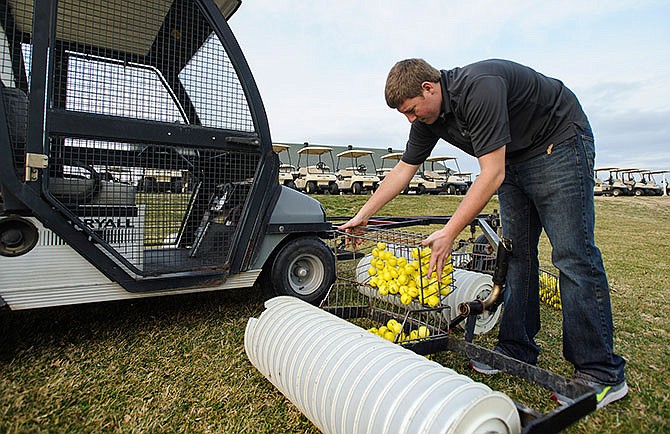Jefferson City golfers may soon see beer sales begin at Oak Hills Golf Center.
With no questions or discussion, the Jefferson City Parks and Recreation Commission approved a recommendation to sell alcohol, primarily beer, at the city's only public golf course with a vote of 6-2 at its regular meeting Tuesday. Commissioners Bob Weber and Cindy Layton voted against the move, while commissioner Darryl Winegar was not present at the meeting.
Last month, the Oak Hills Golf Course Advisory Committee voted to recommend the sale of alcohol at the course, but the final decision had to come from the full commission.
Oak Hills, the city's only public golf course, has never sold beer or other alcoholic beverages because of a condition of the original donation.
Philanthropist Arthur Hough donated 50 acres in 1917 for the city to use as a park. One of the restrictions Hough placed on the deed stated: "No beverages containing any quantity of alcohol or the substitute shall ever be used or drunk on said grounds."
Some people believe Hough's heirs signed a quit claim deed to free the land of restrictions in 1952, but no record of the deed can be found at the Cole County Recorder of Deeds office.
The city filed a lawsuit in 1991 in hopes of condemning the property and causing it to revert back to the city without restrictions, but the City Council backed off when public opposition formed.
Bryan Wolford, assistant city attorney, said at the February meeting, instead of actively seeking to clear the title of restrictions, they would take a more passive approach by simply allowing the alcohol sales to start and seeing if any Hough heirs decide to take action. Wolford said he was confident any legal action would end in the city's favor, adding the statute of limitations on land issues is 10 years.
Wolford pointed to the following state statute: "No action for the recovery of any lands, tenements or hereditaments, or for the recovery of the possession thereof, shall be commenced, had or maintained by any person, whether citizen, denizen, alien, resident or nonresident of this state, unless it appears that the plaintiff, his ancestor, predecessor, grantor or other person under whom he claims was seized or possessed of the premises in question, within ten years before the commencement of such action."
Wolford also had argued none of the other conditions of the original donation have been adhered to, and people already bring their own alcohol on the property to drink, which is a violation of the original conditions.
The original deed of Hough's donation, filed in August 1917, outlined the following conditions of the donation, in addition to the prohibition of alcohol: the grounds should be enclosed with "a good and substantial fence" within five years of the donation; an extension of Moreau Drive into the grounds no less than 20 feet wide within five years of the donation; a bronze tablet should be erected on the grounds with "a suitable inscription" stating the grounds were donated to the city by Hough for public park purposes; grounds cannot be used for any purpose "that would detract from its character as a public park;" grounds "shall be forever used for public park purposes;" and the park should be called Hough Park.
Other than the grounds consistently being used for park purposes, the city has never completed any of the other conditions.
There also was a survey of Oak Hills Golf Course users that stated of 118 responses, 96, or 81.36 percent, said they supported the commission's efforts to sell beer at the golf course as a new revenue source to keep down green fees.
When asked why he voted against the move to sell alcohol at the course, Weber said it was because the commission should honor the commitment that has already been made. Layton said she voted against it because she does not drink alcohol.
At the committee meeting in February, Tina Werner, general recreation and support services division director, said the department could start selling alcohol by April. Werner also said selling alcohol is estimated to generate about $32,000 annually, which would help cut down the amount needed to subsidize the course.
Related story: Our Opinion: City must keep promise to donor, residents

